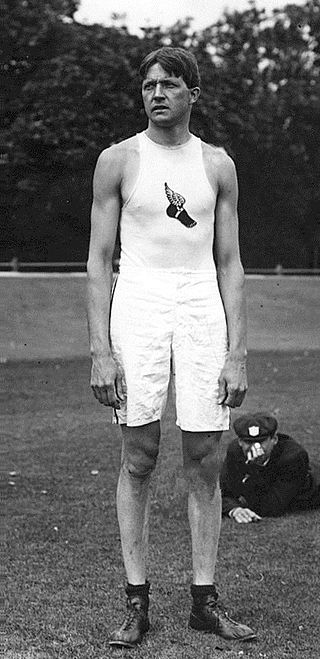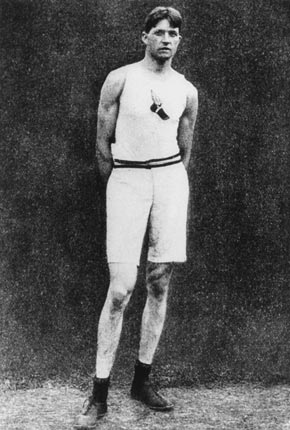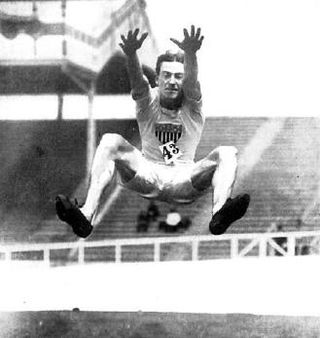
At the 1900 Summer Olympics, twenty-three athletics events were contested. Altogether, 117 athletes from 15 nations competed. A total of 68 medals were awarded. In many countries, due in part to the conflation of the Olympic Games and the World's Fair in Paris, the media discussed only the athletics events under the "Olympic" name while ignoring the incredible variety of other sports featured at the time.

Raymond Clarence Ewry was an American track and field athlete who won eight gold medals at the Olympic Games and two gold medals at the Intercalated Games. This puts him among the most successful Olympians of all time.

The men's high jump was a track & field athletics event at the 1900 Summer Olympics in Paris. It was held on July 15, 1900. Eight athletes from seven nations competed in the high jump. The event was won by Irving Baxter of the United States, the nation's second consecutive victory in the men's high jump. Great Britain and Hungary each took medals in their first appearance in the event.

The men's pole vault was a track & field athletics event at the 1900 Summer Olympics in Paris. It was held on July 15, 1900. Eight athletes from five nations competed in the pole vault.

The men's triple jump was a track & field athletics event at the 1900 Summer Olympics in Paris. It was held on July 16, 1900. 13 athletes from six nations competed. The event was won by Myer Prinstein of the United States, the nation's second consecutive victory in the men's triple jump. Prinstein became the first, and through the 2016 Games, only, person to have won both the long jump and the triple jump. James Brendan Connolly took second, making him the first man to medal twice in the triple jump. Lewis Sheldon finished third, completing what would later be known as a medal sweep.

The men's standing long jump was a track & field athletics event at the 1900 Summer Olympics in Paris. It was held on July 16, 1900. Four athletes from two nations competed in the standing long jump. The event was won by Ray Ewry of the United States, with his teammate Irving Baxter the runner-up; the two dominated all three of the standing jumps in 1900, finishing first and second in each. Ewry would take gold medals in all eight standing jump events from 1900 to 1908. The bronze medal was won by Émile Torchebœuf of France.

The men's standing triple jump was a track & field athletics event at the 1900 Summer Olympics in Paris, France. It was held on July 16, 1900. 10 athletes from four nations competed in the standing triple jump. The event was won by Ray Ewry of the United States, who took gold in all three of the standing jumps in 1900. His teammate Irving Baxter earned silver in all three 1900 standing jumps. The American sweep was completed with Robert Garrett taking bronze.

The men's long jump was one of six jumping events on the Athletics at the 1908 Summer Olympics programme in London. The competition was held on July 22, 1908. Thirty-two athletes from 9 nations competed. NOCs could enter up to 12 athletes. The event was won by Frank Irons of the United States, the nation's fourth consecutive victory in the first four Olympic Games. Calvin Bricker of Canada took bronze to break up the Americans' attempt at another sweep.

The men's triple jump was one of six jumping events on the Athletics at the 1908 Summer Olympics programme in London. The competition was held on 25 July 1908. Twenty athletes from eight nations competed. NOCs could enter up to 12 athletes. The event was won by Tim Ahearne of Great Britain, breaking a streak of three American victories in the triple jump. All three medal-winning nations were on the podium for the first time.

The men's standing high jump was one of six jumping events on the athletics at the 1908 Summer Olympics programme in London. The competition was held on July 23, 1908. 23 high jumpers from eleven nations competed. NOCs could enter up to 12 athletes. The event was won by Ray Ewry of the United States, his third consecutive victory in the event. Ewry won all eight standing jump events from 1900 to 1908 as well as both events at the 1906 Intercalated Games. Konstantinos Tsiklitiras of Greece took silver, tying with American John Biller. Tsiklitiras was the first non-American to medal in the event; the United States had swept the medals in both 1900 and 1904.

The men's standing long jump was one of six jumping events on the athletics at the 1908 Summer Olympics programme in London. The competition was held on Monday, July 20, 1908. Twenty-five long jumpers from eleven nations competed. NOCs could enter up to 12 athletes. The event was won by Ray Ewry of the United States, his third consecutive victory in the event. Ewry won all eight standing jump events from 1900 to 1908 as well as both events at the 1906 Intercalated Games. Konstantinos Tsiklitiras of Greece took silver. American Martin Sheridan earned bronze.

The men's standing long jump was a track and field athletics event held as part of the athletics at the 1904 Summer Olympics programme. It was the second time the event was held. The competition was held on Monday, August 29, 1904. Four athletes, all from the United States, competed. Ray Ewry continued his dominance of the standing jumps at the Olympics, successfully defending his championships in this one as well as the other two. He also set a new world record. Charles King took silver, with John Biller receiving bronze.

The men's standing triple jump was a track and field athletics event held as part of the Athletics at the 1904 Summer Olympics programme. It was the second time the event was held. It was held on September 3, 1904. Four athletes, all from the United States, competed. Ray Ewry continued his dominance of the standing jumps at the Olympics, successfully defending his championships in this one as well as the other two. Charles King took silver, with Joseph Stadler earning bronze. With only Americans competing, the second consecutive sweep was assured; with the event no longer held after these Games, no non-American athlete ever won a medal in the standing triple jump.

The men's standing high jump was a track and field athletics event held as part of the Athletics at the 1904 Summer Olympics programme. It was the second time the event was held. It was held on August 31, 1904. 5 athletes from 2 nations competed. Ray Ewry continued his dominance of the standing jumps at the Olympics, successfully defending his championships in this one as well as the other two. Joseph Stadler took silver, with Lawson Robertson earning bronze to complete the American sweep.

The men's long jump was a track and field athletics event held as part of the athletics at the 1912 Summer Olympics programme. The competition was held on Friday, July 12, 1912. Thirty long jumpers from 13 nations competed. NOCs could enter up to 12 athletes. The event was won by Albert Gutterson of the United States, the nation's fifth gold medal in the event in five Games. Calvin Bricker of Canada became the second man to win a second medal in the long jump, adding a silver to his 1908 bronze. Sweden won its first long jump medal with Georg Åberg's bronze.

The men's standing long jump was a track and field athletics event held as part of the Athletics at the 1912 Summer Olympics programme. It was the fourth and final appearance of the event. The competition was held on Monday, July 8, 1912. Nineteen long jumpers from eight nations competed. NOCs could enter up to 12 athletes. Ray Ewry, who was the three-time defending champion in the event, did not compete in 1912. The silver medalist from 1908, Konstantinos Tsiklitiras, won the event. Platt Adams, the sixth-place finisher four years earlier, took second. Benjamin Adams finished third. Each of the three standing long jump medalists also medaled in the standing high jump, though in a different order.

The men's standing high jump was a track and field athletics event held as part of the athletics at the 1912 Summer Olympics programme. It was the fourth and final appearance of the event. The competition was held on Saturday, July 13, 1912.

The high jump at the Summer Olympics is grouped among the four track and field jumping events held at the multi-sport event. The men's high jump has been present on the Olympic athletics programme since the first Summer Olympics in 1896. The women's high jump was one of five events to feature on the first women's athletics programme in 1928, and it was the only jumping event available to women until 1948, when the long jump was permitted.

The long jump at the Summer Olympics, is grouped among the four track and field jumping events held at the multi-sport event. The men's long jump has been present on the Olympic athletics programme since the first Summer Olympics in 1896. The women's long jump was introduced over fifty years later in 1948, and was the second Olympic jumping event for women after the high jump, which was added in 1928.

The triple jump at the Summer Olympics is grouped among the four track and field jumping events held at the multi-sport event. The men's triple jump has been present on the Olympic athletics programme since the first Summer Olympics in 1896. The women's triple jump is one of the more recent additions to the programme, having been first contested in 1996. It became the third Olympic jumping event for women after the high jump and long jump.




















